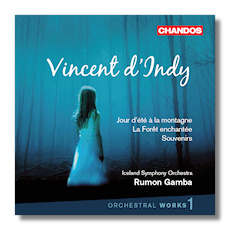
The Internet's Premier Classical Music Source
Related Links
- d'Indy Reviews
- Latest Reviews
- More Reviews
-
By Composer
-
Collections
DVD & Blu-ray
Books
Concert Reviews
Articles/Interviews
Software
Audio
Search Amazon
Recommended Links
Site News
 CD Review
CD Review
Vincent d'Indy

Orchestral Works, Volume 1
- Jour d'été à la montagne, Op. 61
- La Forêt enchantée, Op. 8
- Souvenirs, Op. 62
Iceland Symphony Orchestra/Rumon Gamba
Chandos CHAN10464 DDD 63:25
Things are looking up for Vincent d'Indy. So far this month I've reviewed a first recording (on the Timpani label) of his youthful "Italian" Symphony and the present CD, which is labeled as "Orchestral Works, Volume 1." Apart from the Symphony on a French Mountain Air, and (rarely) the Symphony #2 and Istar, d'Indy's orchestral works have been neglected. These new recordings have me wondering why. This is emotionally direct music, although d'Indy was much too subtle a musician to push his muse into anyone's face.
Perhaps he wasn't the most original composer. Even when he is derivative, though, the influences are so varied and so unexpectedly juxtaposed that the music attains a sort of originality anyway. In the Jour d'été à la montagne (Summer Day on the Mountain), for example, Wagner and Scriabin meet Ravel and Franck on the summit; Richard Strauss and Respighi drop in, everyone shakes hands, and goes home together. The listener is left asking, "What was that?," but more from happy surprise than confusion.
Most familiar of these three works, Jour d'été à la montagne (1905), is not to be confused with the Symphony on a French Mountain Air, which is really more of a concerto anyway. Jour d'été à la montagne has many similarities to Richard Strauss' Eine Alpensinfonie, which wouldn't be completed for another decade. (For example, in both works, the sun sets to the same music to which it rose, except in reverse.) D'Indy keeps the metaphysics out of his day on the mountain, however, which, unlike Strauss's work, is in three distinct sections: "Dawn," "Day," and "Evening." The Frenchman's powers of orchestration are hardly inferior to Strauss', and those coming to Jour d'été à la montagne for the first time are likely to be delighted.
Souvenirs came almost immediately after, and is dedicated to the memory of "the Beloved" – d'Indy's wife Isabelle, who in 1906 unexpectedly died of a brain hemorrhage. She is represented by a theme from one of d'Indy's piano works, written some 25 years earlier. In this superb 19-minute "poem for orchestra," d'Indy seems to have composed a retrospective of his life – mostly happy, apparently – with Isabelle. The ending while tragic, is also peaceful; this was a good way to go. Again, French and German influences cozy up to one another with perfect equanimity, providing no foretaste of the Great War that was to follow in less than a decade.
La forêt enchantée (The Enchanted Forest) was one of d'Indy's first orchestral scores, dating from 1878. Also known as "Harald," it is based on a ballad by the German poet Johann Ludwig Uhland, an exponent of the Romantic style. A band of knights, led by Harald, travels through the forest. One by one, they are led astray by female elves; only Harald resists their blandishments – and d'Indy makes them sound rather attractive – but when he drinks from an enchanted spring, he falls into an eternal slumber, as the elves gather round. The music tells the story in detail, requiring only 13 minutes to do so! Franck's influence seems at its strongest here.
British conductor Rumon Gamba has been Music Director of the Iceland Symphony Orchestra since 2002. Previous associated with a series of film music CDs for Chandos, Gamba now shows his mettle in strictly classical repertory. His readings are beautifully paced, with a fine ear for color and drama, although these are not overdone. Even if their sound isn't ideally French (you know it when you hear it!), the Icelandic musicians are plenty warm too, and I don't think these recordings are likely to be surpassed soon, unless Charles Munch rises from the dead. I am looking very forward to Volume 2!
Copyright © 2008 by Raymond Tuttle




















